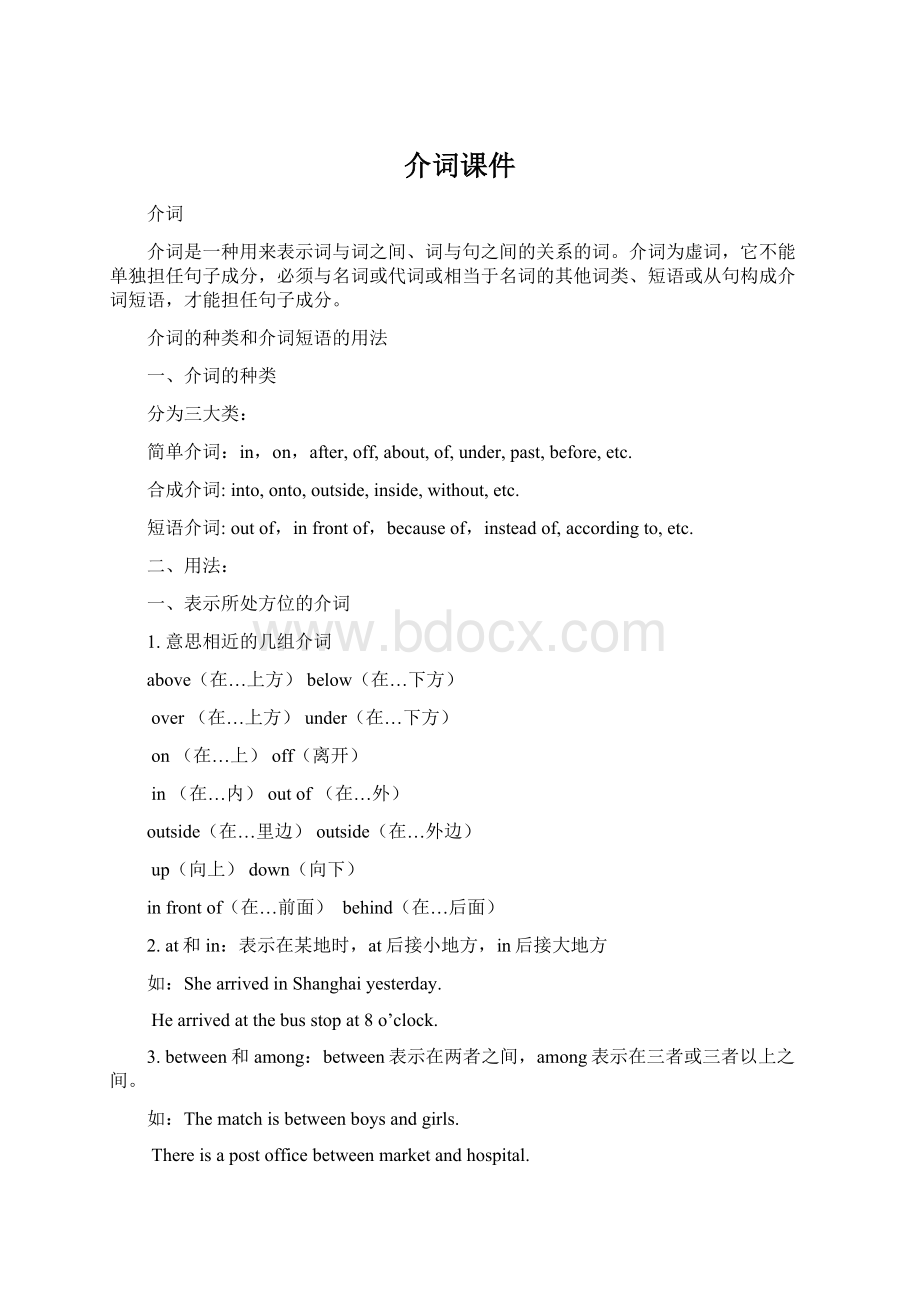介词课件.docx
《介词课件.docx》由会员分享,可在线阅读,更多相关《介词课件.docx(10页珍藏版)》请在冰豆网上搜索。

介词课件
介词
介词是一种用来表示词与词之间、词与句之间的关系的词。
介词为虚词,它不能单独担任句子成分,必须与名词或代词或相当于名词的其他词类、短语或从句构成介词短语,才能担任句子成分。
介词的种类和介词短语的用法
一、介词的种类
分为三大类:
简单介词:
in,on,after,off,about,of,under,past,before,etc.
合成介词:
into,onto,outside,inside,without,etc.
短语介词:
outof,infrontof,becauseof,insteadof,accordingto,etc.
二、用法:
一、表示所处方位的介词
1.意思相近的几组介词
above(在…上方)below(在…下方)
over(在…上方)under(在…下方)
on(在…上)off(离开)
in(在…内)outof(在…外)
outside(在…里边)outside(在…外边)
up(向上)down(向下)
infrontof(在…前面)behind(在…后面)
2.at和in:
表示在某地时,at后接小地方,in后接大地方
如:
ShearrivedinShanghaiyesterday.
Hearrivedatthebusstopat8o’clock.
3.between和among:
between表示在两者之间,among表示在三者或三者以上之间。
如:
Thematchisbetweenboysandgirls.
Thereisapostofficebetweenmarketandhospital.
Thevillageliesamonghills.
4.above、over和on:
1)above“在…之上;高于…”表示相对高度,不一定是在正上方。
它的反义词是below
Theplaneflewabovetheclouds.飞机在云层上面飞行。
2)over“在…之上;在…正上方”表示垂直正上方,其反义词是under
Thereisanewbridgeovertheriver.
Thereisaboatunderthebridge.
3)on“在…上面”表示与物体有表面接触
Thereisabookonthedesk.
5.by、near和beside:
“在…附近”
by表示“就在旁边”,较near更近;near表示“在..附近”,距离不远,反义词是far;beside表示“近旁;紧靠”,相当于nextto
Hesitnearthewindow.
Thechildrenareplantingtreesbytheriver.
Helivesinatownbesidethesea.
6.across和through:
“穿过;通过”across表示从物体表面“穿过;通过”,through表示从物体内部“穿过;通过”
Heswamacrosstheriver.
Theywalkedthroughtheforest.
7.in和into:
“进入…内”in表示“在…之内”,into表示“进入…内”
Heworksinahospital.
Thetigerjumpedintotheriver.
8.on和onto:
on表示“在…上”,onto表示“到…上”
Helivesonthefifthfloor.
Themonkeyjumpedontothecrocodile’sback.
9.infrontof表示“在…前面”,inthefrontof表示“在…前部”
Thereisabigtreeinfrontofthehouse.房子前有一棵大树
Thereisanewdeskinthefrontoftheclassroom.课室里的前面有一张新的桌子
二、表示时间的介词
表示时间上一点的介词有at,on,from…to,till/until,by,since,before,after,etc.
1.at用于表示钟点,“在某一时刻,某一时点”,夜里,中午及某些词组中。
atlunch在午饭时atbreakfast早餐时atnoon正午时
atthattime那时atnight在夜间atthemoment此刻,目前atpresent目前atnine(o’clock)在九点钟
atfirst开始的时候,起初atlast最后
attimes偶尔,有时attheendof1999在1999年末
atthistimeof(the)year在一年中的这个时候
Weusuallyhavelunchatnoon/attwelve.
我们通常中午吃午饭(十二点吃午饭)
注意:
表示时间的名词前有this,last,next,every等修饰时,其前面不加介词。
thismorning今天早上;lastMonday上周一;everyweek每周
2.on用于确定的时间,“在具体的某一天或某一天的上午、下午、晚上或一般节日”
onMonday在周一onTuesdaymorning在周二早上
onJune6th在6月6日onMay4,1996在1996年5月4日
onacoldnight在一个寒冷的夜晚onthatday在那天
onChristmasDay在圣诞节那天ontime准时
onMondayevening在周一晚上
onthenightofJuly(the)first在七月一日的夜晚
Wedidn’tlistentothelectureonWednesdayafternoon.
周三下午我们没去听演讲。
3.in用于表示“在某月、季节、年、世纪”以及泛指的上午、下午、晚上。
(指在一段时间内)
in2007在2007年inMarch,2007在2007年3月
inspring/summer/autumn/winter在春/夏/秋/冬天
inthemorning/afternoon/evening在上午/下午/晚上
intheweek在这周intheholiday在假期中
Theplanetookoffontime.飞机准时起飞了。
Peoplegoskatinginwinter.人们冬天去滑冰。
Dotheyworkinthedaytimeoratnight?
他们是白天工作还是夜里工作?
4.since和from
1)since接时间点,常与完成时连用
如:
Hehasworkedheresince2001.
Theschoolhasbeentheresince2000.
2)from从……起(时间)
表示“从……开始”时,一般都是用词组from…to…,而单纯表示确切的“从几点开始”时用at。
Themeetingwillbeheldfromeighttoten.
这个会议将从8点开到10点。
Themeetingwillbeheldateight.
会议将从八点钟开始。
5.after和in:
after表示“在…之后”,可用于多种时态,是before的反义词。
in表示“在…时间内”或“在…时间后”,一般表示以现在为起点的以后,常与将来时态连用,后接一段时间。
如:
Jimwillbebackintwohours.
Helefthomeaftertwodays.
6.before,after(注:
两个既可以作介词又可以作连词)
A.before在……之前
Washyourhandsbeforedinner.(before作介词)吃饭前请洗手。
Hewillcallmebeforeheleaveshere/beforeteno’clock.
(前一个before作连词;后一个before作介词)
他离开这儿之前/十点之前,将给我打电话。
B.after在……之后
Let’ssingsomesongsafterschool.
(after作介词)放学后咱们唱歌吧!
Pleaseclosethedoorafteryouleavetheroom.
(after作连词)离开房间后请关门。
7.by,until/till
A.by在……前(时间);截止(到)……
HowmanyEnglishbookshadyoureadbytheendoflastyear?
到去年年底以前你看过多少本英文书?
ShehadleftbythetimeIarrived.我到时(之前)她已经走了。
例:
bytheendof在……底(之前)
bythen到那时bythetime+从句在……之前
B.until/till知道……为止(时间)
Wedidn’tbegintowatchTVuntil/tillnineo’clock.
一直到九点,我们才开始看电视。
(begin是点动词,所以用否定式)
Iwillwaitforhimuntilhecomeshere.
我将在这儿一直等到他来。
8.during,through
A.during在……期间
Theyaregoingtohaveagoodrestduringthesummerholidays.
暑假中他们打算好好休息一下。
B.through一直……(从开始到结束)
Theyplayedthecardsthroughthenight.
他们打了一整夜的牌。
HestayedinLondonthroughthewinter.
他整个冬天都待在伦敦。
C.for达……之久(表示经过了多少时间)
可以和一般现在时、过去时、将来时连用,但经常和完成时连用。
Hehaslivedherefor20years.他在这儿已经住了二十年了。
Wewillstayinthecityfortwodays.我们要在这座城市呆两天。
*比较:
for和during。
for之后大多跟表示时间、具体天数等的数字名词。
而during后决不能跟表数字的名词。
9.within不超过……的范围
within3hours3小时之内;withinaweek一周之内
Imustfinishpaintingthecatwithinfiveminutes.
我必须在五分钟之内画好这只猫。
*比较:
within和in。
within强调“在……时间之内”,没有时态的限制。
in是以现在为基础,inanhour是指从现在起一小时之后,所以in一般只用于将来时。
三、表示方式或手段的介词
1.by意为凭借“工具或手段”(多用于交通工具),不用冠词
如:
bybike/bus/train/plane/ship/subway/taxi
By+不涉及交通工具的名词(不用冠词)
如:
bysea/air乘船/飞机
2.with意为“用…工具”
如:
Hebrokethewindowwithastone.
Hestoppedtheballwithhisrightfoot.
3.on意为“以…方式”,用于交通工具、手段、通讯方式等。
多用于固定词组。
如:
Theytalkedonthetelephone.他们通过电话进行交谈
Hegoestoschoolonhisbikeeveryday.
(onhisbike=bybike)
四、常用介词的其他方法
1.about作“关于”解时,表示内容
如:
astoryaboutLeiFeng一个关于雷锋的故事
2.on作“关于”解时,表示论题
如:
abookonradio一本关于无线电的书
3.like作“像…”解时,表示相似
如:
Helookslikehismother.
4.in表示“穿着;戴着”或“某种语言,材料”等
如:
ThegirlinredisJane.
CanyousayitinEnglish?
Helikestowriteitinblackink.
5.as作“作为”解时,表示身份
如:
Asastudent,wemustweartheschooluniforms.
6.with有“和…一起”和“用某种工具”的意思
如:
IalwaysgotoschoolwithJane.
Ihavenomoneywithme.我身上没带钱
Weseewithoureyes.
7.without可表示“没有,无”
8.expect作“除了…之外,都…”解,表示排除
如:
9.about和around“大约”,over(=morethan),below(=lessthan)等介词表示数量,是约数
如:
I’vebeenthereabouttenyears.
Therearearound800girlsintheschool.
五、含介词的固定搭配
1.动词+介词
lookup查看,查(字典);
playwith玩某物(玩耍)
Don’tplaywithfire.别玩火。
thinkof想起,想到;hearfromsb.收到某人的信;
talkabout谈论某事;talkto/withsb.和某人谈论;
lookat注视;listento倾听;callonsb.拜访某人;
arriveat/in到达;takecareof照顾;waitfor等待;lookfor寻找。
Add…to加到……上 agreewith同意(某人)
arriveat(in)到达 askfor询问
begin…with从……开始 believein相信
2.Be动词+形容词+介词
bekindto对(某人)亲切;
begoodat在……做得好;擅长于……
belatefor迟到;beafraidof害怕;besorryforsth.为……抱歉;
beabsentfrom缺席;beproudof以……为自豪;
befoundof喜欢 befullof充满
beinterestedin对…有兴趣 bekeenon热衷于
beconfidentin对…有信心 beshortof缺乏
besickof厌恶 beproudof对…感到骄傲
beloyalto对…忠诚 beashamedof为…感到羞耻
3.介词+名词
1)英语中有大量成语由介词构成,单是一些常用介词就可构成大量成语:
at:
atastretch一连,连续地 atatime一次,每次
atease稍息,安心 atfirstsight一见(钟情)
atfirst最初,开始时 atheart在内心
athome在家,随便 atlast最后
atleast至少 atlength最后,详细地
atmost至多 atonce立即,同时
atpeace(war)处于和平(战争)状态 atplay(work)在玩耍(工作)
atpresent现在,目前 atrandom随意地,胡乱地
attheriskof冒…的风险 atthesametime(与此)同时
atthestart一开头 atthetime此刻,这时
attimes有时候 atwill任意地
by:
byaccident偶然 byair航空
byallmeans想一切办法
bychance偶然 bycheque用支票
bychoice出于自愿 bydaylight在大白天
byday(night)白天(夜间) byforce靠武力
bymistake错误地,误把… byturns轮流
bysurprise突然,出其不意 bytheway顺便说一句
in:
inasense从某种意义上说 inaddition(to)此外(除…之外)
inadvance事前 inall总共
inanycase(event)不管怎样,反正inbrief简而言之
incase要是,如果 incaseof在…情况下
incomparison比较起来 indanger处于危险中
indebt负债 indemand有需求
indetail详细地 infact实际上
ingeneral一般说来 inone’sopinion在(某人)看来
inorderto(that)以便,为了 inotherwords换句话说
inpart(s)部分地 inperson亲自
inpractice实际上 inpublic(private)公开(私下)地
inregardto关于 inshort总之
intheend最后 inthemiddleof在…中间
intime及时地,经过一段时间 invain白白地,没有结果
on:
onaccountof由于 onbehalfof代表(某人)
onboard在船(飞机)上 oncondition在…条件下
onduty值班 onfire着火
onfoot步行 onguard有警惕,值班
onhand在身边 onholiday在休假
onpurpose故意地 onsale在出售
onstrike罢工 onthecontrary相反
ontheway在路上 ontime准时
onthetopof在…上面 ontherun正在逃窜
outof:
outofaction失灵 outofbreath气喘吁吁
outofcontrol失去控制 outofdanger脱离危险
outofdoors在户外 outoffashion不时新
outofhand失去控制 outoforder坏了
outofreach无法得到(拿到) outofsight看不见
outoftemper发脾气 outofquestion不可能
outoftouch(with)和…失去联系 outoftune走调
outofuse不再使用 outofwork失业
5.有些介词夹在名词之间构成成语:
dayafterday日复一日地 yearafteryear年复一年
oneafteranother一个接一个地 onebyone一个接一个
littlebylittle一点一点地 sidebyside并肩
stepbystep一步步地 facetoface面对面
arminarm手挽手地 handinhand手牵手地
daytoday日常的 daybyday一天一天地
daybeforeyesterday前天 dayaftertomorrow后天
hearttoheart互相交心的
6.还有一些成语包含两个介词:
frombeginningtoend从头至尾 frombadtoworse越来越糟
fromtimetotime不时地 fromheadtofoot浑身
frommorningtonight从早到晚 fromstarttofinish从头至尾
fromdoortodoor挨门挨户地 fromplacetoplace到各地
fromgenerationtogeneration一代一代地fromcovertocover(书面)全部地,从头至尾
7.其他搭配
句型It’s+adj.+of+sb.+todosth.和It’s+adj.+for+sb.+todosth.的区别。
前者的形容词侧重于对“人”的品格、精神的评价;后者侧重于对不定式所表示的事情的评说。
如:
It’scarelessofyoutoloseyourkeysagain.
你真是太粗心了,又把钥匙弄丢了。
It’sveryimportantforustolearnEnglishwell
学好英语对我们很重要。